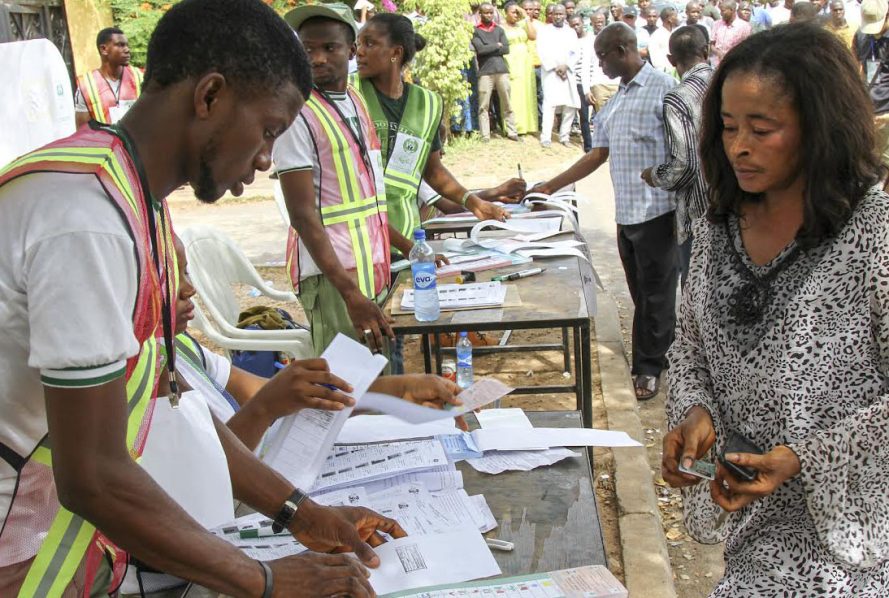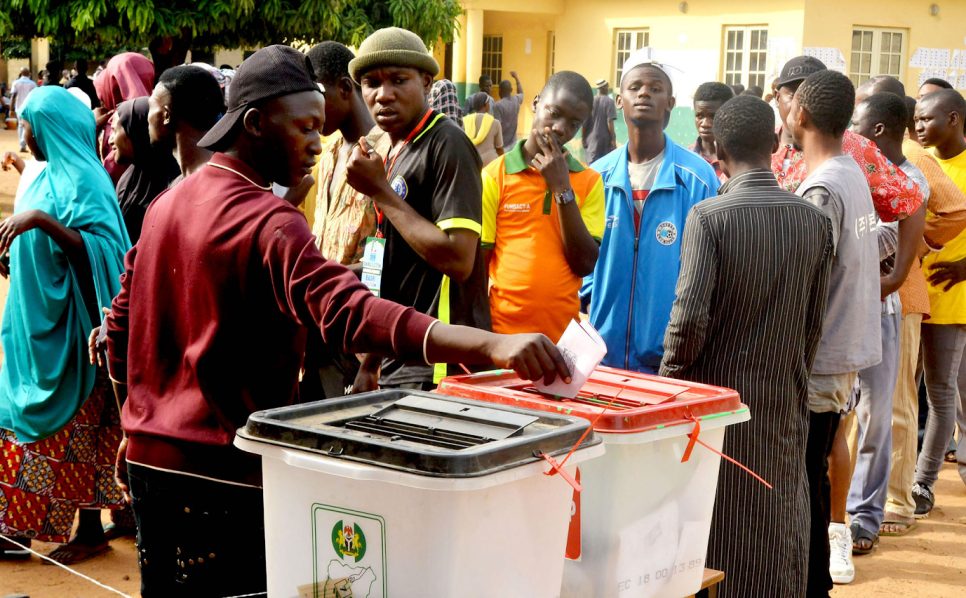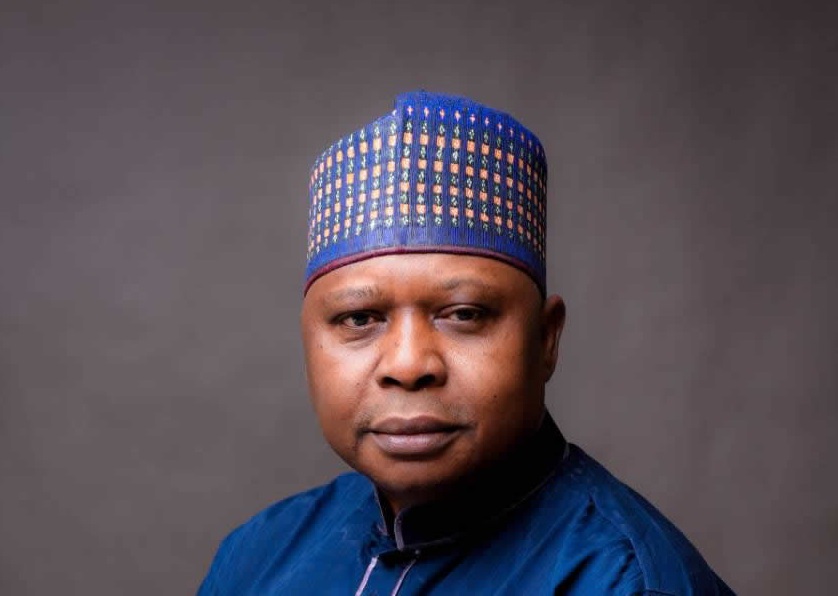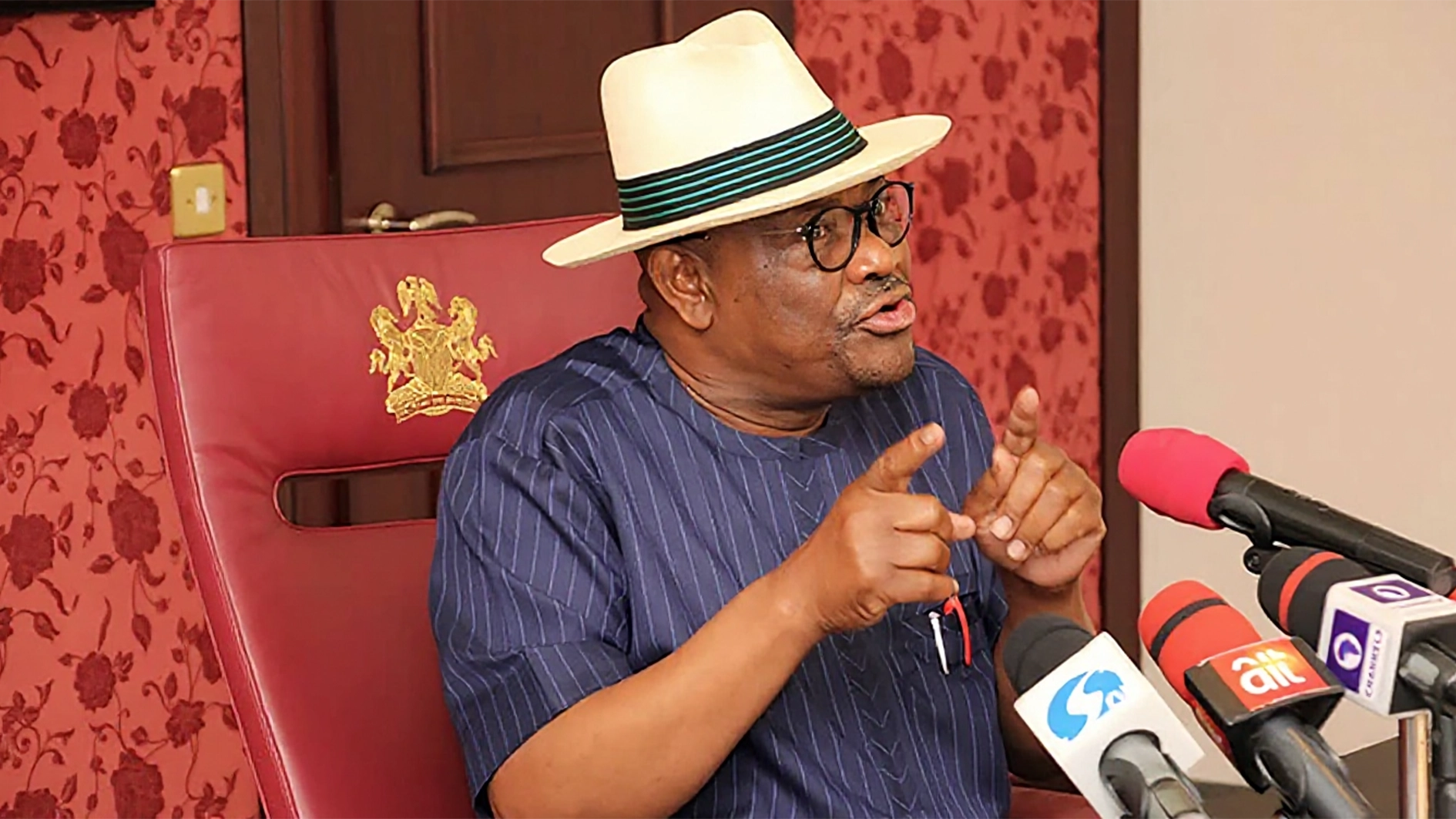
• Contradictions between INEC’s actions, laws must be addressed — SDP chairman
• Parties should have representatives in INEC’c, says Olurode
• Act should be amended to have INEC chairman appointed by independent body – YPP
• Amending laws without political reforms a futile exercise, CDD insists
• ‘NASS ready to amend electoral act 2022 to address fresh concerns’
Although the 2023 general election has come and gone, the last is yet to be heard about the polls owing to ongoing court cases that arose from its conduct.
One significant step that solidified people’s confidence in the election was the signing of 2022 Electoral Act Amendment Bill into law by former President Muhammadu Buhari on February 25, 2022.
The new Act repealed the Electoral Act No. 6, 2010 and was widely adjudged as a game changer in Nigeria’s electoral system.
However, certain low points in the conduct of the 2023 elections have become grounds for stakeholders to seek amendment of the 2022 Act ahead of the 2027 general elections.
This is even as The Guardian gathered that the 10th House of Representatives has put up a motion to undertake six reforms on the electoral system via amendments to the Electoral Act 2022.
Recall that the events surrounding the July 16, 2022 Osun governorship election, which was the first major election conducted with the Electoral Act 2022, had prompted a reassessment of some of the measures adopted by the Independent National Electoral Commission (INEC) during that off-season poll. A key innovation was the full deployment of the Bimodal Voter Accreditation System (BVAS), designed to bolster the transparency of the voting process, especially the accreditation of genuine voters, which, hitherto, could be manipulated the politicians.
INEC had asserted that the technological advancements embedded in the new law were aimed at addressing prevalent issues in Nigeria’s election result management process, ranging from over-voting, falsification of accredited voter numbers, swapping of result sheets, forging of results and computational errors.
The overarching goal was to facilitate prompt detection and effective resolution of such issues, ultimately fostering a more credible electoral system.
Despite these proactive measures, the occurrence of over-voting in the Osun governorship election, the inadequacies observed in the conduct of the 2023 general election and the recent off-season governorship polls in Imo, Bayelsa and Kogi states, where some polling stations had to suspend operations owing to the discovery of pre-filled result sheets, cast doubt on the overall integrity of the nation’s electoral system.
Analysts believe that the flaws in the system have made the courts to become very visible and powerful in determining the outcome of electoral contests, hence, the need to amend the Electoral Act 2022 ahead of the 2027 general election.
Two major candidates in the February 25, 2023 presidential election, Alhaji Abubakar Atiku of the Peoples Democratic Party (PDP) and Peter Obi of Labour Party (LP), who lost the election to President Bola Ahmed Tinubu, had expressed dissatisfaction with the process.
A key grievance of both candidates revolved around INEC’s inability to electronically transmit results, which they considered a violation of the Electoral Act. But the Presidential Election Petitions Court held that the only technological device that was mandatory for the INEC to use for the election is the BVAS.

“There is no provision for the electronic transmission of election results in the Electoral Act 2022. It is at best optional,” the five-man panel, led by Justice Haruna Tsammani, ruled.
The two candidates appealed the judgment but the Supreme Court upheld it and affirmed that Tinubu won the presidential election.
Speaking after the judgment, Atiku proposed some amendments to the Electoral Act, which he believed would help democracy to thrive in Nigeria.
“We can urgently make constitutional amendments that will prevent any court or tribunal from hiding behind technicalities and legal sophistry to affirm electoral heists and undermine the will of the people.
“First, we must make electronic voting and collation of results mandatory. This is the 21st century and countries less advanced than Nigeria are doing so already. It is only bold initiatives that transform societies.
“We must provide that all litigation arising from a disputed election must be concluded before the inauguration of a winner. This was the case in 1979. The current time frame between elections and inauguration of winners is inadequate to dispense with election litigations,” he said.
Section 285 (6) of the Electoral Act 2022 provides that an election tribunal shall deliver its judgment in writing within 180 days from the date of the filing of the petition.
But there are arguments that allowing election petitions to continue after the winners might have been sworn-in is akin to giving the defendants undue advantage to use the state resources to fight their opponents at the tribunal.
Another area of concern in the electoral law is Section 24 (3), which provides for cancellation of results where there is violence or where there has been substantial disruption of election in a polling unit or constituency.
Stakeholders are seeking a review of the section, arguing that this aspect of Electoral Act emboldens aggressors in the political space to gain upper hands against their opponents.
Though not a new campaign, they are also calling for the establishment of an Electoral Offences Commission and stiffer penalties for electoral offenders without the option of fines to serve as deterrent.
However, there are those who strongly believe that the setbacks witnessed during the 2023 general election and the recent off-season polls indicated that even the best laws would not yield results if those responsible for their implementation fall short in their duties.
National Chairman of the Social Democratic Party (SDP), Shehu Gabam, told The Guardian that there are so many contradictions between what is in the Electoral Act and what INEC is doing.
According to him, if those gaps and contradictions are not corrected, free, fair and credible elections will continue to elude Nigeria.
He said: “There are multiple areas in the Electoral Act that should be reviewed. If you could remember vividly, even when this same 2022 Electoral Act was at the verge of being signed, a lot of issues were raised.
“None of the political parties were consulted or invited during the public hearing. If you remember then, the two controversial areas were direct primaries and indirect primaries. But we told the whole nation that we had no template for direct primaries and that if you don’t have a template, you cannot start experimenting in the general election. INEC themselves said they had no template for direct primaries.
“And therefore, we resolved that direct primaries would be counter-productive for our democracy; it will create more crises. In SDP, we experimented with direct primaries and I am telling you that it is one of the most difficult and complicated methods. The cost is extremely out of this world. So, we can manage and modernise what we have; we need to legitimise parties and protect the sanctity of votes.
“The crime here is that people will go and cast their votes and ad-hoc staff would be employed to conduct elections and you cannot establish the loyalty of these ad hoc staff. INEC ought to have over one million staff but they don’t have. They have just about 100,000 staff. If you don’t have people that believe in the conviction of the institution to conduct free and fair elections, then you cannot have free and fair elections.”
On electronic transmission of results, Gabam urged the National Assembly to amend the Electoral Act and make it mandatory from the next general election in 2027, including the uploading of polling unit-level results and result sheets used at different levels of result collation.
He added: “If the court said e-transmission of results is not mandatory, why then do INEC put it in their guidelines that it is mandatory? So, the contradictions are too much. We have to look at the gaps that have dragged us into this mess.”
National Publicity Secretary, Young Progressives Party (YPP), Egbeola Martin, also said that going forward, national real-time electronic transmission of election results should be made compulsory by law.
Noting that the 2023 elections exposed the failure of the human element in the electoral process, he said BVAS did not fail but the human factor failed Nigerians.
He also stressed the need to review the process of appointing the INEC Chairman, Resident Electoral Commissioners and other appointees in the commission.
He said the law should be amended to make the appointment of INEC Chairman and RECs the job of an independent panel comprising Civil Society Organisations (CSOs), the National Judicial Commission (NJC), labour unions, among others.
He added: “The job of the INEC Chairman and RECs should be thrown open to credible individuals with requisite qualification and basic criteria. The job should be advertised in the dailies where interested candidates can apply after which successful candidates will be shortlisted and subjected to public scrutiny before final ratification and endorsement by the independent panel.
“We need to strengthen all our institutions since all the arms of government are involved in the electoral process. If RECs and other INEC officials can be investigated, prosecuted and sent to jail when found guilty, judges should not be exempted when found guilty in order to curb miscarriage of justice in election matters. The fact that there are so many conflicting judgments in similar cases brings to the fore the infallibility of the judges and the urgent need for the same to be checkmated.”

On his part, former National Commissioner of INEC, Prof. Lai Olurode, observed that reforms of the nation’s democratisation process are continuous, adding that no nation can reach perfection but will always continue to improve its practices.
While justifying the increasing calls for further reforms in the electoral system, he lamented that Nigerians were not getting value for their investment in the electoral process.
The Professor of Sociology canvassed for the establishment of an agency to handle political party administration and electoral offences, saying INEC should have no business overseeing such activities.
Declaring that nothing was really wrong with the current Electoral Act, Olurode, who was Dean of the Faculty of Social Sciences, University of Lagos (UNILAG), said what is happening to the nation’s electoral space is more of looking at the place of structure and the role of agents in a state.
He said: “Of course, the structure might be defective but you can have a situation that even if the structure is defective, you have agents that are committed and that really want to do some good for their country. I have not seen much patriotism in our practice of our democracy. The question we usually ask is: What is in it for me or what is my benefit? And that is where the gap is.
“Number one, there is no doubt that INEC needs to be unbundled. The mandate of INEC is so loaded that it has difficulties defining its priority right and always thinking that it has to attend to areas in which the constitution has spelt out a role for it. And therefore, this is making INEC lose real focus of its mandate. I think the mandate of INEC is basically to organise elections, conduct transparent and credible elections to fill offices as stipulated in the constitution.
“For instance, about 95 per cent of election cases in which INEC was involved have to do with pre-election matters and INEC cannot ignore those pre-election matters because they have to do with which candidates are going to be fielded for elections. This means INEC already got distracted from its main mandate, which is to conduct elections.
“Another thing is to look at the number of political parties that we have. I am saying in a nutshell that there is a need to have a body that will be concerned with internal party democracy; that will be responsible for the organisation of party primaries so that it would not be the responsibility of INEC. This will make the commission remain focused.
“The same thing also applies to prosecution of electoral offenders. There are so many now. People are now exploiting the current weaknesses of INEC. INEC cannot continue to monitor political parties, political crimes and electoral crimes. There are so many of them engaging in money culture during elections. Are we talking of the ones that do all sorts of things behind the scenes just to see that they get to the position of powers at all cost?
“I believe that there is a need to have a commission saddled with the duty to prosecute electoral offenders so that INEC will not be burdened with that.”
On the issue of amending the Electoral Act to allow elections petitions to end before winners are sworn-in, Olurode said: “When the agency I suggested earlier is set up, it is going to be the responsibility or burden of that organisation that will be in charge of political parties to handle cases that deal with selection of candidates. They would have started much ahead of time so that INEC that is expected to take care of elections will be busy printing ballots, perfecting its practices towards the election and making sure there will be credible elections.
“On election security, I would like to suggest the practice in India. In India, once it is time for elections, the rule is that the police as a structure come under the chairman of the electoral commission. They are disciplined by the commission.
“In Nigeria, a few policemen just do whatever they like because they know that the INEC chairman cannot punish them and that the best INEC can do is to make a report to the Inspector General of Police or to the Police Service Commission that normally posts them to the areas of election. And without security you can’t do any election.
“So, INEC’s time is consumed in securing the electoral process to the extent that you will think that INEC itself is the headquarters of the police. Why should INEC be burdened with that?
“If we can adopt the system in India by letting the chairman of the commission have formidable power in terms of disciplining staff, I think it will be fantastic for our democratisation efforts.”
Olurode also suggested that Nigeria should adopt the method used in Germany in appointing members of the Electoral Commission.
He said: “When it comes to appointing the INEC chairman, I think the president of the country exercises tremendous power. I will suggest that we take a cue from Germany where there is what is called Bundestag. That is to say some of the people that would be appointed into the electoral commission will be sent in by the parties.
“For example, since election is a civil matter, we shouldn’t be thinking that INEC Commissioners, whether at the state or national levels, have no political preferences. Let’s not be utopians. They have their political and economic preferences. They are human beings so they cannot be said to be completely immune from the political activities in their country. So, how do we manage? “First of all, we must concede that they have political preferences. So, why can’t we allow political parties to appoint a few members into the electoral commission?
“It can be reflected in the constitution; we can have parties like PDP, APC and other parties having certain numbers of party members in INEC depending on their strengths. You elect according to the proportion of voters that are behind you. We can amend our constitution and the Electoral Act to reflect appointments into INEC on a partisan basis. Parties can select members that will be in the INEC board on that basis. So, when all of them get there, they will now select who will be the chairman among them. With this method, there will be checks and balances because no member of a political party will allow the other party to corrupt the umpire.
“The fact is that what INEC National Commissioners do is that they are also directly or indirectly hiding under a veil to promote the interest of a political party. But by applying the method I stated, they can now confess what parties they represent during their meetings.
“We should do this rather than pretending that they (INEC) are neutral and not politically biased. That is nonsense and such statements are not true. Even if the President continues to appoint the INEC Chairman, it will not matter much if political parties are adequately represented in the election management body.”
Olurode, however, noted the greatest challenge to Nigeria’s electoral space is how to reform the minds of politicians, adding that even with the best laws, politicians would likely mess up the process.

“That now requires re-orientation. We just have to make up our minds if we want to build a nation. That is what America does. It is not that they have faultless institutions. No! They have institutions that are failing them but they still believe in their country. We shouldn’t lose hope at all. If Nigeria doesn’t work, it is going to be disastrous for Africa,” he stated.
For a Senior Non-Resident Fellow, Centre for Democracy and Development (CDD), Prof. Adele Jinadu, no manner of Electoral Act review would bring the needed changes in Nigeria’s democracy without effective political reforms.
According to him, Nigeria’s democracy is basically driven by non-democrats whose only intention is to grab power at all cost.
“If you don’t do political reform, then you can’t get anywhere. Some will even say let’s change the constitution and ensure only one term of five years and all that. The problem is not that you have two terms or one term; it is that the political parties are behaving in a manner that shows that they are deliberately trying to scuttle democracy in this country. And I think the mass media is also encouraging them by giving them the platform to speak.
“I have seen governors talking in a way that raises concerns about us. So, what is important is that we look at those elements of the political environment which continue to pose serious challenges to the conduct of democracy in this country,” Jinadu said.
Programme Director, Baobab for Women’s Human Rights (BAOBAB), Anne Lawal, also noted that reviewing the Electoral Act would be just one solution to the challenges confronting the nation’s electoral space, adding that a major way out is to employ a multi-pronged approach to solve the problems.
She said: “Yes, we can look at the Electoral Act but beyond that let women also have quotas within the political party structures, because if women are not allowed in those party structures, even if we have all the laws in place, nothing is going to change. We do have some laws, but they are not being acknowledged.”
Also, a renowned gender activist, Ene Ede, argued that most challenges in the electoral space are attitudinal, calling for an effective implementation of legislations.
She said: “Reviewing the Electoral Act is part of the solution; the issue is the implementation. Look at the Violence Against Persons (Prohibition) Act. Section 23 of the VAPP act criminalises political violence and part of political violence is exclusion. So, the minimum we should have, according to the national agenda, is 50-50.
“The problem is not too much for us to address. It is our attitude towards how to address it. It is not supposed to be rocket science. It’s just an attitudinal shift.”






